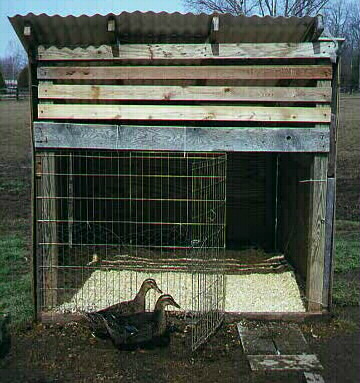Keeping Ducks for Pets and Food

There are a lot of reasons to keep ducks...
- ducks make interesting pets
- ducks eat bugs, slugs, and anything else they can catch
- ducks lay eggs which you can eat just like chicken eggs
- ducks provide meat
- ducks are easy to contain
- ducks do not require vaccinations or vet care
The Basics
Our set up is very simple. Ducks need water, food, and a safe place to spend the night.
- Water
- Ducks require water to swallow and need at least 4" of water in order to clear their nostrils. Our system is to provide the ducks with small rubber tubs of water. They are changed once a day in the winter and two or three times a day in the summer. Some people use a "kiddy pool". A fifty gallon water trough works well, too, but it is more difficult to clean out.
- Food
- Our ducks are fed commercial laying mix (which is chicken feed for egg laying hens). We use this because most of our ducks are egg layers. Our meat ducks are confined and fed only the chicken feed which seems to diminish the ducky taste. Our egg ducks are feed the chicken feed and allowed to forage. Keep the feed in metal trash cans to prevent spoilage from moisture and rodents.
- Safe housing
- There are different arrangements that can be used for housing your ducks. The most important housing requirement is to protect your
ducks from predators...foxes, skunks, raccoons, bobcats, coyotes, and dogs are the most common in our area. It can be as simple as a dog house inside a secure pen or an elaborate chicken-type coop with a yard. Our ducks roam freely during the day and are secured in a coop/pen at night. This is bedded with wood shavings which is changed as it becomes soiled.
How to Get Started
Once you have your "basics" in place and you are ready to get your ducks. Buy ducklings or young (under 6 months old) ducks if available.
If the ducklings are too young, you'll need to keep them inside until the weather is warm enough (70 degrees). Very small ducklings don't have the ability to generate and maintain body heat
like adults. Ducklings with the down feathers are not water proof and can drown as they easily become
waterlogged.
If the weather permits, we keep our ducklings outside during the day and bring them in at night to
keep them warm. At about 8 weeks of age, they usually have their adult feathers
and can stay outside all the time.
We feed our ducklings "Chick Starter" for the first 5 months.
By six months, we feed our ducks on a commercial
mix made for laying hens. By this time, our ducks are also eating bugs and other
"fresh" food that they forage for on their own. We've seen our ducks eat worms, grasshoppers, small frogs, flies, and anything else they can catch. Our ducks are particularly fond of
slugs and have learned that slugs can be found under the horses' water trough.
Whenever I change the water and clean it out, they come running over because
when I lift it up to empty it, there is a feast to be had.

The number #1 Rule of Homesteading: use what materials you have on hand.
 Links to other sites on the Web
Links to other sites on the Web
 Cornell Duck Health Site
Cornell Duck Health Site
 A duck collector's site
A duck collector's site
 a neat personal duck site
a neat personal duck site



© 1997, 2001
This page hosted by  Get your own Free Home Page
Get your own Free Home Page



 Links to other sites on the Web
Links to other sites on the Web Cornell Duck Health Site
Cornell Duck Health Site A duck collector's site
A duck collector's site a neat personal duck site
a neat personal duck site